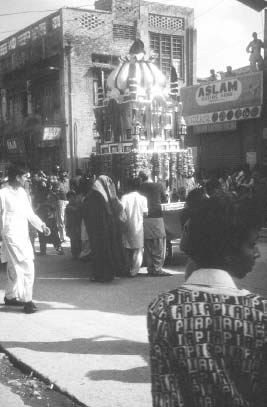IslamHolidays and Regular Observances |
Does the beginning of the Muslim year have any particular significance? |
During the first ten days of the month of Muharram, Muslims reflect on a variety of spiritual themes. During Muhammad’s time the community observed a one-day fast on the 10th of the month (‘Ashura, pronounced aaSHOOrah), possibly paralleling the Jewish practice of fasting on the 10th of Tishri, generally known as Yom Kippur. Though the major fast was formally shifted to Ramadan, Muslims still observe this day, some with fasting and prayer. Like many holy days, ‘Ashura has become associated with ancient events of great significance. This day marks the day on which Noah left the ark. Visitors to Mecca can enter the Ka’ba itself (not just the sanctuary around it) on this day alone.
But the first ten days of the year are still more important for Shi’a Muslims. Some readers may recall the day in 1979 when Iranian students took over the U.S. embassy in Tehran. It occurred on the 1st of Muharram in the year 1400 after the Hijra, the beginning of the traditional period of mourning for the proto-martyr Husayn, who died at the hands of a tyrannical ruler in the year 680 C.E. Observance of the sad event gains in intensity until the actual day of martyrdom, some observing a fast on the 9th day. On ‘Ashura itself, some Shi’ites make pilgrimages to Karbala in Iraq, site of the martyrdom, or to the tombs of other Imams in Iran and Iraq. In more traditional Shi’a villages, people still gather to reenact the events in a “passion play” called the Ta’ziya (pronounced ta’ZEEyah). Looking at the bigger picture, a Hadith says that at the beginning of each new century (on the lunar Islamic calendar) God will raise up for the Muslim community a “renewer” who will call all believers to a fuller participation in the faith.

Procession of Shi’a Muslims carrying a model of the tomb of the proto-martyr Husayn in commemoration of his death, as they observe ‘Ashura (the tenth day of the first lunar month) in Rawalpindi, Pakistan. (Courtesy of David Edwards.)
